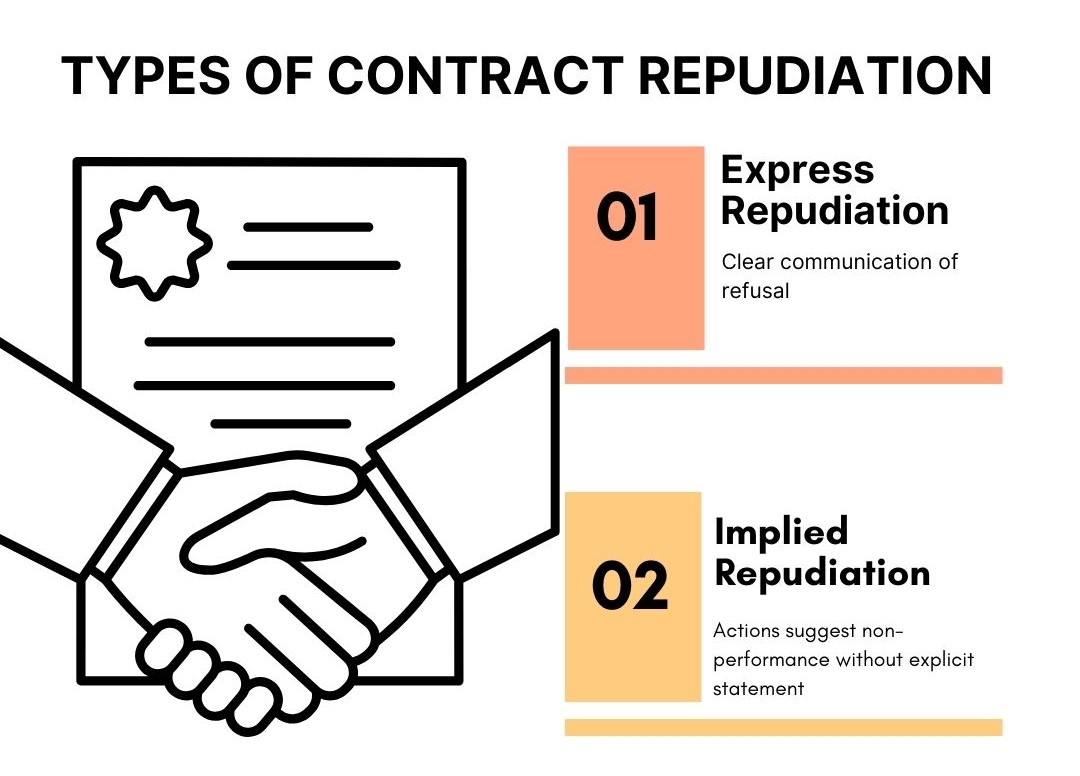Introduction
Indeed, contracts provide the underlying basis for business arrangements. They offer a legal framework that defines the rights and obligations that accrue to each of the parties to the deal. What if one of the parties does not fulfill its side of the bargain? That is where one starts discussing repudiation of a contract. Understanding the phenomenon is one of the several elements necessary for a business to effectively protect itself and respond appropriately when faced with a breach. This guide will analyze the meaning, types, legal framework, and practical steps involved in managing similar cases in the USA.
1. What Is Repudiation of a Contract and Why Should Businesses Care?
Repudiation of a contract occurs when one party, through words or actions, clearly indicates an intention not to fulfill their obligations under the agreement. This type of breach can seriously disrupt business operations and lead to significant financial losses for the non-breaching party. There are two primary forms of contract repudiation that every business should understand.

- Express Repudiation: This kind of repudiation occurs when one party-there is a clear communication to the other that there will be no performance of the contract. Example: A supplier informs a company that it will not deliver goods as agreed; this is express repudiation.
- Implied Repudiation: Implied repudiation exists when a party of the contract shows through conduct or behavior that he cannot or will not perform the obligations under the contract, and it does not necessarily say so explicitly. For example, a contractor abandons a construction project before the completion without any explanation or justification.
2. Legal Framework for Contract Repudiation in the United States
Reflected in common law principles, repudiation of a contract is also associated with such statutes in the United States. These two sources, among others, provide guidance on how repudiation should be interpreted and handled:
- Uniform Commercial Code (UCC):
Primarily governing the sale of goods, the UCC outlines the rights, responsibilities, and remedies for parties facing contract repudiation. It ensures a standardized approach across different states for commercial transactions. - Restatement (Second) of Contracts:
This authoritative legal reference provides detailed explanations and guidance on general contract law, including rules concerning repudiation and anticipatory breaches.
Contracts laws can differ from state to state, and thus, a business must know the local legal site with respect to its own agreements. Getting advice from a competent lawyer will help in knowing state specific doctrines and avoidance of possible legal wrangling.
3. Common Examples of Contract Repudiation
Real-world repudiation recognition enables businesses to take timely action. Here are some common examples that can be found among different industries:
- Business Contracts: A supplier informs a company that they will not deliver the agreed-upon goods or services, despite the contract’s terms.
- Employment Agreements: An employee states they will not fulfill their contractual duties, such as quitting without notice or refusing to complete assigned tasks.
- Real Estate Transactions: A buyer or seller withdraws from a property deal without any legally valid reason, jeopardizing the transaction.
- Construction Projects: A contractor abandons a project midway or fails to show up for work, signaling an unwillingness to complete the job.
- Service Agreements: A service provider stops delivering promised services, such as a software maintenance company discontinuing support without cause.
In each scenario, the non-breaching party must promptly assess the situation, minimize potential losses, and explore legal remedies to protect their interests.
4. Steps to Respond to Repudiation
When faced with repudiation of a contract, businesses must take strategic steps to protect their interests:
Step 1: Verify the Repudiation
Before taking any action, it’s essential to confirm that repudiation has indeed occurred. This involves gathering evidence, such as written communication or documented actions, indicating the other party’s refusal to perform.
Step 2: Mitigate Damages
The non-breaching party has a legal duty to mitigate damages. This means taking reasonable steps to reduce the financial impact of the repudiation. For example, if a supplier fails to deliver goods, the business might source the products from another vendor to minimize losses.
Step 3: Choose Remedies
There are several remedies available to the non-breaching party:
- Damages: Seeking monetary compensation for losses incurred due to the repudiation.
- Specific Performance: A court order requiring the breaching party to fulfill their contractual obligations. This remedy is typically used in cases involving unique goods or services.
- Rescission and Restitution: Terminating the contract and restoring both parties to their pre-contractual positions.
Step 4: Legal Consultation
Navigating the complexities of contract repudiation often requires professional legal advice. Consulting with an attorney can help businesses understand their rights and choose the most appropriate course of action.
5. Legal Consequences for the Repudiating Party
Repudiation can have significant legal and financial consequences for the party that breaches the contract. These may include:
- Damages: The breaching party may be required to compensate the non-breaching party for any losses suffered. The amount of damages awarded depends on the extent of the loss and the terms of the contract.
- Specific Performance: In some cases, a court may order the breaching party to fulfill their contractual obligations. This remedy is more common in cases involving unique goods or services.
- Rescission and Restitution: The contract may be terminated, and both parties restored to their original positions. This remedy aims to undo the effects of the breach and prevent unjust enrichment.
6. Defending Against Accusations of Repudiation
If a business is accused of repudiating a contract, there are several defenses that can be raised:
- No Actual Breach: Demonstrating that the alleged actions do not constitute repudiation. For example, a delay in performance might be justified if it is due to unforeseen circumstances.
- Good Faith Efforts: Showing that the business made reasonable efforts to fulfill its contractual obligations. Courts are generally more lenient when a party acts in good faith.
- Impossibility or Impracticability: Arguing that performance was impossible or impracticable due to factors beyond the business’s control, such as natural disasters or government regulations.
7. Real-World Examples
Understanding how repudiation of a contract plays out in real scenarios can be insightful:
- Case Study 1: Supply Chain Disruption A logistics company failed to deliver goods due to a strike. The buyer sued for anticipatory repudiation, winning damages.
- Case Study 2: Property Lease Dispute A tenant informed the landlord they would vacate before the lease ended, leading to litigation over lost rental income.
8. How Legitt AI Can Help Manage Contracts
Managing contracts effectively is crucial for preventing and addressing repudiation. This is where AI-powered solutions like Legitt AI come into play.
- Automated Contract Review: Legitt AI can analyze contracts and identify potential risks, including clauses that could lead to repudiation. This helps businesses address issues before they escalate.
- Early Detection of Repudiation: By monitoring contract performance and communication, Legitt AI can detect signs of repudiation early. This allows businesses to take proactive measures.
- Enhanced Compliance: Legitt AI ensures that contracts comply with legal standards and best practices, reducing the risk of disputes and breaches.
By leveraging AI technology, businesses can streamline contract management, reduce legal risks, and improve overall efficiency.
Read More: Stages of Contract Management Lifecycle Process
Conclusion
The repudiation of a contract is a very serious issue with far-reaching legal and financial consequences for businesses. It is wise to understand the idea, identify indicators related to it, and take action to protect contractual interests. Companies can rely on the steps in this guide and AI-powered solutions such as Legitt AI to make better use of varied complexity in failures of contract performance.
Thus, proactive contract management, combined with legal expertise, ensures that a business is equipped and not caught completely unaware when repudiation happens.
Did you find this article worthwhile? More engaging blogs and products about smart contracts on the blockchain, contract management software, and electronic signatures can be found in the Legitt AI. You may also contact Legitt to hire the best contract lifecycle management services and solutions, along with free contract templates.
FAQs on Contract Repudiation
What is contract repudiation, and why is it important for businesses to understand?
Contract repudiation occurs when one party indicates they will not fulfill their contractual obligations. Understanding it helps businesses protect their interests and respond effectively to avoid operational disruptions and financial losses.
What are the main types of contract repudiation?
There are two types:
• Express Repudiation: The breaching party explicitly states they won’t meet their commitments.
• Implied Repudiation: Actions or behavior suggest non-performance, even without a direct statement.
How does the Uniform Commercial Code (UCC) relate to contract repudiation?
The UCC provides standardized rules for handling repudiation in the sale of goods across the U.S., outlining rights and remedies for affected parties. This ensures consistent legal treatment in commercial transactions.
What steps should a business take when facing contract repudiation?
Key steps include:
1. Verify the repudiation with evidence.
2. Mitigate damages to reduce financial impact.
3. Choose appropriate remedies, such as seeking damages or specific performance.
4. Consult a legal expert to navigate the process.
What are the potential legal consequences for the party that repudiates a contract?
Consequences may include:
• Paying damages to compensate the non-breaching party.
• Court-ordered specific performance for unique obligations.
• Rescission and restitution to return parties to their original state.
How can Legitt AI help prevent and manage contract repudiation?
Legitt AI offers tools for:
• Automated contract review to identify risks.
• Early detection of potential repudiation through performance monitoring.
• Ensuring compliance with legal standards to minimize disputes.
This enhances efficiency and reduces legal risks for businesses.
